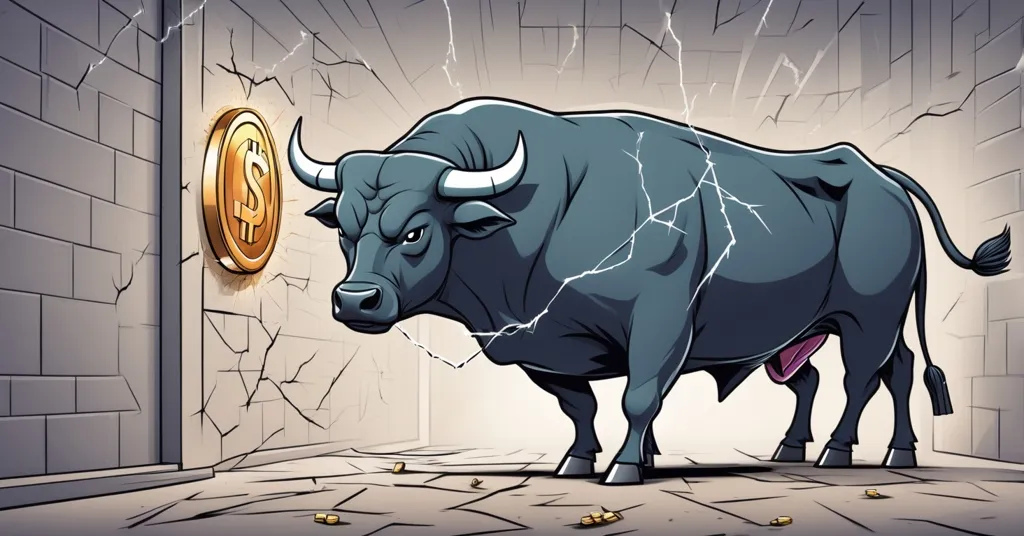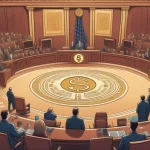SEC Under Fire: Crypto Industry’s Vendetta Against Overregulation

SEC Faces Industry Backlash Over Crypto Regulations: A Modern-Day Vendetta?
The U.S. Securities and Exchange Commission (SEC) is under fire from the cryptocurrency industry, with insiders describing the situation as an “Italian vendetta.” This conflict arises from the SEC’s aggressive regulatory approach under former Chair Gary Gensler during the Biden administration.
- Crypto industry pushes back against SEC over Biden-era regulations
- Ripple, Coinbase, and Gemini lead the charge
- Republican-led SEC reverses Gensler’s enforcement actions
The tension between the cryptocurrency sector and the SEC has escalated significantly, with major players like Ripple, Coinbase, and Gemini taking decisive action against the agency. This pushback stems from what the industry perceives as overly restrictive regulations that stifled innovation. A recent Politico report highlighted the industry’s tactics, which include influencing law firms to refuse interviews or even retract job offers to SEC employees involved in crypto enforcement. This retaliation is a direct response to the SEC’s regulatory strategy during the Biden administration, particularly under former Chair Gary Gensler.
Coinbase’s chief legal officer, Paul Grewal, defended these actions, asserting,
People have a right to earn a living. They have a right to take their talents wherever they want to take them… But we, too, have a right to decide who we’ll work with.
Grewal’s statement reflects the industry’s belief in their right to select business partners and resist perceived persecution by regulatory bodies.
However, not all views align with the industry’s approach. William McLucas, a former SEC enforcement director, expressed concern, saying,
You’re penalizing people who were basically doing their jobs. If they want to rail about the prior commission and its leadership, go ahead. But singling out lawyers and saying, ‘We want their names out there, we want them labeled as pariahs’ — I’ve never seen anything like it.
McLucas’s critique highlights the ethical dilemmas posed by the industry’s vendetta and the potential impact on individual careers within the SEC.
An anonymous industry official, frustrated by the ongoing feud, remarked,
Where’s the goddamn off-ramp? You got Gary Gensler’s scalp. There’s not that many other people you can go after. It’s an Italian vendetta, and I don’t know what to do. Because in most vendettas, nobody actually wins. Everybody keeps dying.
This vivid analogy underscores the intensity and seemingly irresolvable nature of the conflict between the crypto industry and the SEC.
Under the current Republican-led SEC, there has been a noticeable shift in policy. Acting Chair Mark Uyeda, with Paul Atkins nominated as the next chair, is reversing many of the enforcement actions initiated during Gensler’s tenure. This includes halting at least 10 lawsuits and investigations against crypto firms. Critics of Gensler’s “regulation by enforcement” approach—a strategy where rules are enforced through legal actions rather than new legislation—argue that it unfairly targeted the industry and hindered its growth.
The SEC’s historical approach to cryptocurrencies, dating back to 2013, has been characterized by a focus on fraud and unregistered securities offerings. In 2024 alone, the SEC brought 33 cryptocurrency-related enforcement actions. This aggressive stance has led to ongoing tension with the crypto sector, which has been further exacerbated by political shifts. The Trump administration, for instance, has shown a more favorable stance towards cryptocurrencies, with initiatives like the Strategic Bitcoin Reserve and U.S. Digital Asset Stockpile.
Despite the industry’s backlash, there are signs of potential collaboration on the horizon. The establishment of a Crypto Task Force aims to foster innovation while protecting investors, indicating a possible shift towards more supportive regulations. This task force is tasked with reworking registration paths and considering relief for token offerings, which could signal a more balanced approach going forward.
While the crypto industry’s actions against the SEC are seen as a necessary stand against overregulation, it’s important to consider the broader implications for the sector. The ongoing feud might polarize the relationship further, hindering constructive dialogue and cooperation. However, the industry’s push for accountability, as emphasized by Ripple’s top lawyer Stuart Alderoty, suggests a multifaceted approach beyond mere retribution.
As the crypto world continues to evolve, this conflict serves as a stark reminder of the ongoing struggle between innovation and regulation. The key challenge lies in finding a middle ground that fosters innovation while ensuring the integrity of financial markets. The crypto industry’s actions against the SEC may be seen as a bold move, but the ultimate goal should be a regulatory environment that supports the growth of decentralized technologies while safeguarding investors.
Key Takeaways and Questions
- What is the current state of the relationship between the cryptocurrency industry and the SEC?
The relationship is highly contentious, with the crypto industry taking retaliatory actions against the SEC due to perceived overregulation during the Biden administration.
- Who are the key players in the crypto industry’s retaliation against the SEC?
Notable companies involved include Ripple, Coinbase, and Gemini, with Coinbase’s chief legal officer Paul Grewal publicly defending their actions.
- What specific actions have been taken by the crypto industry against SEC officials?
The industry has reportedly influenced law firms to decline interviews or rescind job offers to SEC employees, as a means of retaliation.
- What criticisms have been leveled against the SEC’s former Chair, Gary Gensler?
Critics argue that Gensler’s “regulation by enforcement” approach hampered innovation in the cryptocurrency space.
- How is the current SEC leadership responding to the policies of its predecessor?
The Republican-led SEC is actively reversing enforcement actions that were initiated under Gary Gensler’s leadership.
- What are the potential consequences of the ongoing feud between the crypto industry and the SEC?
The feud might lead to further polarization and could hinder constructive dialogue and cooperation between regulators and the industry, ultimately affecting the sector’s growth and regulatory clarity.
As the crypto industry and regulators continue to clash, the question remains: How can a balance be struck to foster innovation while protecting investors?



